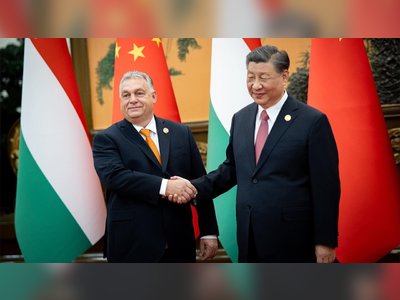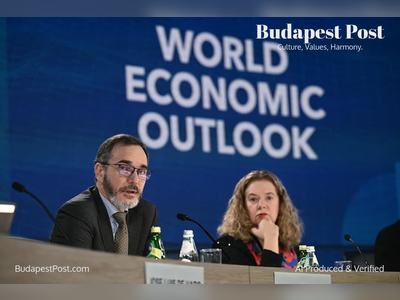Hungary Proposes New Regulation to Suspend Contracts Under EU Recovery Fund
The Hungarian government introduces a draft amendment allowing suspension of funding contracts, raising concerns over implementation timelines amidst EU scrutiny.
On Wednesday, the Hungarian government unveiled a draft amendment to the regulation concerning the European Union's Recovery and Resilience Fund, which would permit the suspension of funding contracts for any application.
Hungary is entitled to approximately €10.4 billion from the recovery fund, translating to around 4,200 billion forints in grants and loans aimed at aiding the country's post-COVID economic recovery.
However, only about €1 billion has been drawn down so far, as the government must meet 27 preconditions, referred to as 'super milestones', as well as numerous additional milestones for regular disbursement requests.
This proposed regulation effectively creates the possibility to suspend the evaluation of funding applications and the signing of support contracts for any project.
Such a suspension is predicated on an inability to submit payment requests to the European Commission, a situation that currently applies due to unmet super milestones.
The text does not indicate that this suspension would be automatic; it merely provides the national authorities with the option to act.
Consequently, it does not necessarily appear that all evaluations and contract signings would be halted, although such a decision remains theoretically possible.
The announcement of the draft coincided with a separate communication from the European Commission urging member states to expedite their processes.
Despite speculations about potential deadline extensions by the Hungarian government, the Commission reaffirmed that all milestones must be fulfilled by the end of August next year, with all payments finalized by the end of 2026.
Raffaele Fitto, Vice-President of the European Commission for Cohesion and Reforms, emphasized the continued priority of accelerating implementation among certain member states.
Following a recent report from the European Court of Auditors, which highlighted slow progress in utilizing the fund, the Commission acknowledged delays, stating that only a third of the milestones had been deemed completed.
Additionally, approximately one-fifth of milestones indicated by national governments were reported as finished.
To optimize the use of the available funds, member states must comprehensively reassess their proposed spending plans and significantly accelerate execution.
Valdis Dombrovskis, the European Commissioner for Economy, urged governments to streamline their proposed initiatives and supplement them with quickly actionable measures.
The European Commission has also provided guidance for preparing final payment requests, stating that only measures that can be reliably implemented should remain in the plans.
In response to inquiries regarding the draft amendment, the government reaffirmed its commitment to securing all available resources.
Hungary has access to €12 billion in EU funding, and negotiations are ongoing to access further funds currently blocked for political reasons.
The government has indicated its proactive approach to financing projects with EU contributions, supported by the fact that Hungary ranks in the middle tier according to European Commission data regarding fund disbursement.
To date, a total of 145 calls for proposals have been issued for the 2021-2027 period, with an overall budget of approximately 6,630 billion forints.
Under operational programs, over 10,600 contracts have been concluded, amounting to more than 4,150 billion forints, with payments exceeding 2,450 billion forints.
Furthermore, there have already been 52 calls for proposals related to the Recovery Plan, with a budget exceeding 209 billion forints.
Recently, 40,817 projects have established support contracts, with disbursements surpassing 1,206 billion forints.
The government has claimed that the actions of leftist politicians in Brussels have resulted in delayed funding, which complicates the timely implementation of certain planned development projects.
Additionally, a significant portion of EU resources is only available for less developed regions, necessitating prioritization among developments.
The proposed regulation, however, does not apply retroactively and does not affect existing funding agreements, with ongoing commitments being met for both operational programs and the Recovery Plan.
Further calls for proposals are expected to be announced in the remaining months of the year.
Hungary is entitled to approximately €10.4 billion from the recovery fund, translating to around 4,200 billion forints in grants and loans aimed at aiding the country's post-COVID economic recovery.
However, only about €1 billion has been drawn down so far, as the government must meet 27 preconditions, referred to as 'super milestones', as well as numerous additional milestones for regular disbursement requests.
This proposed regulation effectively creates the possibility to suspend the evaluation of funding applications and the signing of support contracts for any project.
Such a suspension is predicated on an inability to submit payment requests to the European Commission, a situation that currently applies due to unmet super milestones.
The text does not indicate that this suspension would be automatic; it merely provides the national authorities with the option to act.
Consequently, it does not necessarily appear that all evaluations and contract signings would be halted, although such a decision remains theoretically possible.
The announcement of the draft coincided with a separate communication from the European Commission urging member states to expedite their processes.
Despite speculations about potential deadline extensions by the Hungarian government, the Commission reaffirmed that all milestones must be fulfilled by the end of August next year, with all payments finalized by the end of 2026.
Raffaele Fitto, Vice-President of the European Commission for Cohesion and Reforms, emphasized the continued priority of accelerating implementation among certain member states.
Following a recent report from the European Court of Auditors, which highlighted slow progress in utilizing the fund, the Commission acknowledged delays, stating that only a third of the milestones had been deemed completed.
Additionally, approximately one-fifth of milestones indicated by national governments were reported as finished.
To optimize the use of the available funds, member states must comprehensively reassess their proposed spending plans and significantly accelerate execution.
Valdis Dombrovskis, the European Commissioner for Economy, urged governments to streamline their proposed initiatives and supplement them with quickly actionable measures.
The European Commission has also provided guidance for preparing final payment requests, stating that only measures that can be reliably implemented should remain in the plans.
In response to inquiries regarding the draft amendment, the government reaffirmed its commitment to securing all available resources.
Hungary has access to €12 billion in EU funding, and negotiations are ongoing to access further funds currently blocked for political reasons.
The government has indicated its proactive approach to financing projects with EU contributions, supported by the fact that Hungary ranks in the middle tier according to European Commission data regarding fund disbursement.
To date, a total of 145 calls for proposals have been issued for the 2021-2027 period, with an overall budget of approximately 6,630 billion forints.
Under operational programs, over 10,600 contracts have been concluded, amounting to more than 4,150 billion forints, with payments exceeding 2,450 billion forints.
Furthermore, there have already been 52 calls for proposals related to the Recovery Plan, with a budget exceeding 209 billion forints.
Recently, 40,817 projects have established support contracts, with disbursements surpassing 1,206 billion forints.
The government has claimed that the actions of leftist politicians in Brussels have resulted in delayed funding, which complicates the timely implementation of certain planned development projects.
Additionally, a significant portion of EU resources is only available for less developed regions, necessitating prioritization among developments.
The proposed regulation, however, does not apply retroactively and does not affect existing funding agreements, with ongoing commitments being met for both operational programs and the Recovery Plan.
Further calls for proposals are expected to be announced in the remaining months of the year.
AI Disclaimer: An advanced artificial intelligence (AI) system generated the content of this page on its own. This innovative technology conducts extensive research from a variety of reliable sources, performs rigorous fact-checking and verification, cleans up and balances biased or manipulated content, and presents a minimal factual summary that is just enough yet essential for you to function as an informed and educated citizen. Please keep in mind, however, that this system is an evolving technology, and as a result, the article may contain accidental inaccuracies or errors. We urge you to help us improve our site by reporting any inaccuracies you find using the "Contact Us" link at the bottom of this page. Your helpful feedback helps us improve our system and deliver more precise content. When you find an article of interest here, please look for the full and extensive coverage of this topic in traditional news sources, as they are written by professional journalists that we try to support, not replace. We appreciate your understanding and assistance.










